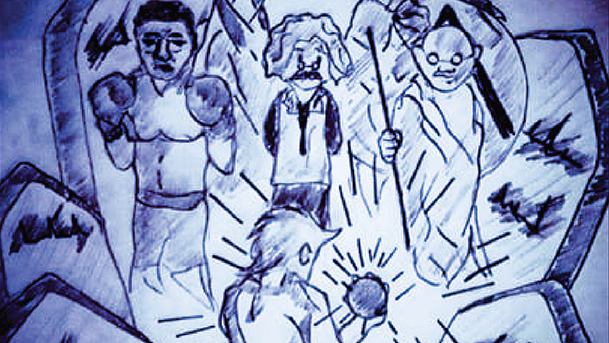Welcome travelers. In mid-August, we took a journey into an epic science fiction story that looks at how close we might stand on the precipice of turning a utopia into a waking nightmare, in the story The End of History: The World Behind Walls. Now, we take a deeper dive by talking to its passionate and talented author. Read on to learn more about T.I. Nikolaos, and discover their process, inspiration, and what else might be coming from them soon.
Tellest: Greetings T.I.! I wanted to offer my thanks for the opportunity not only to experience your story, but to now learn more about you as well. You work on a few different genres, and in a second language to boot, so I’m sure it takes a lot of your time to make sure that a passion project such as this comes to life just the way you want it. Thank you for sharing some of the time you have remaining!
T.I. Nikolaos: Hello, Michael, and thank you so much for this space you have provided for our stories to be seen and discussed!
Writing indeed takes quite a bit of time. In fact, for the End of History, I think I began writing and creating the world (even beyond the story of the first book) almost seven years ago. And the original idea is over a decade old now, even though the book does not resemble that original idea at all anymore. Though I think that is for the best.
T: In most of my interviews, I like to start off by learning how your foundation with storytelling began. You clearly enjoy telling tales, as your work is both vast and detailed. Was there an author growing up that you were drawn to? Or did you perhaps have someone a bit closer in your life who liked to tell stories, and you caught an interest in fantasy and sci-fi that way?
TIN: If we want to talk storytelling we might go as far back as my early childhood, with my grandfather putting me and my brother to sleep with wild fairytales that he made up on the spot, or later on, with his memories from the Greek civil war that raged from 1946-1949. Those of course are not stories for kids to go to sleep with, most of the time, but when I grew up, I learned to appreciate both them, and the way my grandfather was narrating them, making an effort far beyond conveying a message. He actually made us feel the despair and even the humor through the hardship, on very few but very precious occasions. In fact, only last year I had him go through his entire life and I taped it in order to one day write a book about his life. So I will stop talking about that now.
Later on, I of course fell in love with storytelling on many different mediums. Be it books, comics, movies, etc. I do not really care about the medium so much. I just love seeing worlds unraveling all around me in my mind, and then interact with the characters who are for me the most compelling aspect of any story. I have, of course gone through a lot of worlds and characters in life so far. It is hard to think of more iconic characters than Tolkien’s in The Lord of the Rings (I had to read those again when my English was good enough, in order to understand his “voice” in the story, rather than the translations), but if I am to be completely honest, my favorite character that I have ever come across is not from a book at all, but rather from a videogame. And that is the character of Kreia from the videogame Star Wars: Knights of the Old Republic 2. I know it sounds silly if someone has not played the game. But you just have to trust me on that. There is a reason the internet is full of essays on this one-and-done character from a videogame of the early 2000s.
Speaking of Star Wars, it just so happens to be my biggest love when it comes to fantasy. I can appreciate Star Trek and other sci-fi. I do not like to limit myself, however, the chaos of Star Wars provides simply unlimited opportunities for storytelling. Do you want wild west aesthetic and shootouts? No problem. Sword and sorcery? Here you go. Sci-fi? Of course. And so on… It never ends in that world. And just so you know, I of course have an almost complete story for that world in my mind. Putting that to paper is my greatest dream! I can go on forever though, from Lian Hearn’s The tales of the Otori, to Christopher Paolini’s Inheritance, to Isaac Asimov’s I, Robot, to DC’s and Marvel’s superheroes to so many Japanese manga and anime. I have spent so much of my life lost in those worlds. Be they more mature themed or for younger generations, I can enjoy them all depending on my mood. And then I got into university in my twenties, and I started nerding out again, about Iliad and Odyssey and the ancient Greek Warfare.
In fact, I studied History, Archaeology and Social Anthropology, but archaeology was boring to me, and thus difficult, I avoided it as much as possible (though many times it can’t be helped) and social anthropology had many interesting aspects. You can see how random events can create habits in certain populations and then habits turn to laws (written or not) and then populations create naturally their identity… but none of that compared with the study of ancient warfare. So, my focus was on History in my studies, and I spent so much time writing, that it simply became second nature to me at some point. Even though it was still too early to consider the idea of writing a book anything more than a silly fantasy, far beyond my abilities, the idea of spending years of my life creating my own worlds (outside of videogames) was not yet ripe, if that makes sense.
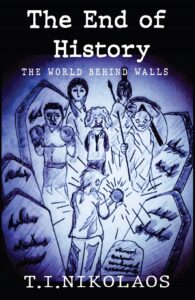
T: You’ve currently released your first epic science fiction story, as well as the first issue of your fantasy comic book series. Which one was the first that you conceptualized, and why do you think that story came about?
TIN: The science fiction story came first. The End of History, though without a title back then was an idea that came to me during a class at the University. For maybe obvious reasons, I drifted away at some point and began building a world that had no history. What would that look like? Would it help people and unburden them from past conflicts? Or in fact make things worse and have them repeat the same mistakes again? Of course, the answer is both, and far more. Some people would act one way, and others would act differently. So, over several months and years, different characters began taking shape and with their decisions began shaping that world, and they kept growing in there, for almost four years, until I finally got the courage to type the first words on a Word document. The first part of the book that I wrote (if anyone is interested) was the second half of the chapter: A Monument in Memory.
T: Besides these two storylines, do you have any other tales that you are working on? I know that you said your day job keeps you very busy, but have you had any other stories tugging on your brain to try and get out onto the page? You mentioned Star Wars above and noted that there are a lot of different genres that sort of fold into that universe. Have you thought of exploring anything in any of those other genres? Any space operas itching to get their story told?
TIN: I have nothing but stories! Many of them are small adventures about heroes and superheroes, but I don’t have the rights for most of those and they must remain fan fiction. I do have several original stories, yet when those plans will develop into anything more, I cannot tell…
One fun idea I had, with dialogue that just kept spamming into my mind making me laugh for quite some time, was a comedy of sorts, where aliens arrive on Earth and they are a very peace-loving and fun species, yet humanity keeps messing things up, to the point where they start a righteous crusade against them, while all they wanted to do was come say hi.
From the human point of view, it would be Independence Day (the movie) and leaders all over the world would use the realization of aliens existing as a means of accumulating more power with the typical fearmongering of incompetent leaders.
From their side, the aliens would feel like an adult trying to communicate with a child that is throwing a temper tantrum. So, from their side it would be more of a Hitchhiker’s Guide to the Galaxy climate, where their technology is so advanced that our world ending attacks would be an annoyance and they would run around in silly fashion, trying to salvage the situation. And the more they try to explain that they mean no harm, the worst the situation would become.
T: You mentioned having some fan fictions there that you’d have to keep locked up. Some of the most famous stories we’ve seen were once fan fictions that were reworked to be unique, new characters instead. Have you thought about doing that with any of your tales?
TIN: I don’t think that is possible. Other than the fact that they are really simple stories, made more for the purpose of experimentation with different ways of creating images and feelings through description and dialogue, most of them are stories based on comics, such as Batman, Green lantern etc. They are like my ‘what if’ stories (like, what if DC’s red lanterns had taken over the Galaxy after a bloody war, and the green lanterns were no more. The main character would be an old blue lantern living in secret, barely able to hold onto some of her power in order to do some jobs to survive and protect some orphans… Original Star Wars meets DC in a way. Those stories have served their purpose, they allowed me to express myself and gain some additional experience from writing them. They are not meant to be anything more…
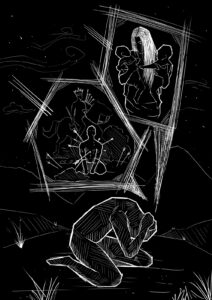
T: Some people might find it surprising to know that you’re not a native-English speaker. You have a very strong command over not only the language as it appears in prose, but you also play with dialog and speaking mannerisms in fun ways as well. How did you manage to pull that all together so well?
TIN: Well, first of all, thank you! Most of the credit would have to go to all my teachers and editors. I haven’t gotten any permissions to just give out their names yet so I will not. But throughout my life I have had many people, try very hard, to overcome all the obstacles that I put in my own way, in all subjects. And of course, my parents must also be given great credit, since they spared no expense towards my (and my siblings) education, regardless of our financial standing. I have been very privileged in that respect, but I still needed the help of a couple of people to make the book feel welcoming to a native speaker. I certainly hope that all the pains, and let’s be honest, expenses, I had to go through were worth it! A reader losing themselves in the experience is the number one goal.
T: Speaking of having your readers lose themselves in the experience, you also do well to provide an immersive experience within your story as well. How did you get into the minds of your characters as well as you did, especially considering the atypical scenarios they find themselves in?
TIN: I am not going to pretend that I know what I am doing! Creating the world was one thing, then I gave my characters a backstory and threw them in it. They took over after that. The decisions they made were a natural conclusion of their life experiences. Considering though that some characters are not used to life-or-death situations, and are suddenly shoved into them, to do my part, with my descriptions of their feelings at the time, I had to draw from what I could from my own life.
Now to make myself clear, I have not had to deal with life-or-death situations. However, to use an example, when I served (my mandatory service) in the Greek army, there was an instance where things moved away from the expected. I don’t want to get in trouble, so I will not give details, but at some point, everything and everyone went on what you might call a silent alert. Meaning everyone had to be ready for anything, with a particularly hot situation, yet it should not be visible.
It was three in the morning, and I was about to go do something, and suddenly every high-ranking member got their signal and moved to their positions over a (very) large area. We knew there was a reason to be ready. We knew it was not an exercise, but little else. I remember knowing what I would have to do, but the reality of it actually happening felt like a dream. As if it was not happening to me. It was nothing dramatic in the end, yet that feeling stayed with me, and that is what I try to describe when a character that has known routine, has to come up against a terrifying possibility or reality.
Now as I said, I can only hope I did okay with the descriptions of their feelings. But the characters, I kid you not, act on their own. Twice I had to adjust my story because after writing dozens of pages of a character, I realized that they would never follow the path I had outlined at first. A person that has spent their entire life prioritizing their survival first, would not do “the right thing” at certain moments, no matter how it might help your plot. They might do it when there is no cost to them, but for anything more, their story would need to develop and impact their character in meaningful ways.
T: When you let your characters “drive” so to speak, do they ever truly surprise you about where they go, and what they do?
TIN: Of course. There was an instance in the book, when I had planned for one of the main characters to panic and abandon his life and go into hiding when the story began. As the character kept growing, I realized that would never be his choice given his life. He would seek refuge by his brother’s side. So, the workaround would be for his brother to send him into hiding. But at that point, his brother had grown into an officer of the law, who believed in the world’s system, so he would never try to work outside it. So, neither of the brothers worked towards the story. And they moved in another direction, until a third character took over the situation. And as a result, things became simpler and more complicated at the same time. I am mostly steering towards a general conclusion. The rest is up to them.
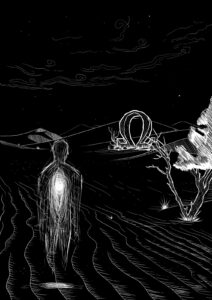
T: All right, let’s loop back around to The End of History: The World Behind Walls. It was obviously a massive undertaking. How did you keep yourself motivated to finish such a sizable book, and with such daunting subject matter?
TIN: It was indeed, and it is only the beginning of the story. Which means that for the story in that book, all 600+ pages, I had to create a world far, far bigger than what is now on paper. My bedroom looks like the home of a lunatic. It is filled with little pieces of paper on every wall, furniture, and shelf. Even my monitor has small pieces of paper all around it. I tried using software to keep track of everything, but I am hopeless, and got lost in it…in a bad way. I also have stacks of notebooks and bigger notebooks and smaller notebooks all around, because I just have to write the first draft by hand.
So, motivation was never a problem with me. As soon as I find some free time, I just jump into a world and let loose the characters. Then they take over (I am not joking). It is time that is my greatest enemy. Or rather the lack of time. Most of my day is invested at work.
I have been working in our family business for a few years now, ever since I finished with my mandatory service in the army. My mother owns a bakery of sorts, and it takes a lot of work to keep the lights on…
So, writing, for now, has to come second, or third in line. It is the thing I look forward to whenever I can.
T: You mentioned earlier that The End of History is not the end of the series. With the first story being such a monumental task, but one that certainly must have felt rewarding in completing, how does the thought of returning there feel? Is it a daunting prospect, or are you excited and eager to return there?
TIN: It is both! For one I feel scared, as if every new word will diminish the quality (such as it is) of the original book. And yet I have been planning this story for so long, that I can’t wait to write it down and see how it turns out. At the same time, I see all the arcs and the plans I have made, and I get anxious that I will not be able to do my excitement justice, if that makes any sense. Yet I try to stay positive! What is the worst that can happen? (Famous last words?)
T: I think the best way of looking at it is that you come into this follow-up book with more experience than with your first book. As long as you stay true to the characters, you should be in good shape!
TIN: I think so too! It is genuinely terrifying to have something that you love so much being laid bare out there for people to pick on, any way they want…but what is the alternative? Just keep it secret, unchanging, and stagnant? What purpose would that serve? I think that growth is a painful experience, but refusing to grow out of fear of that pain will have an even worse conclusion.
Yes, the book is out there. I have no idea what I fear the most: people never reading it, or people doing so and sharing their opinions of it, in less than graceful ways? But I want to get better, and the only way for that to happen will be for people to see and critique the book—tell me what they did not like and why (the why is always the most important part). And when I am convinced that something was done wrong, be it in my way of writing or the ideas I am presenting, I will adjust.
I did not get my university degree on my way in, I accumulated years of mistakes first. That is the only way to gain experience I feel…make mistakes and have someone show them to you. How they do it is their problem, and how you take the critique is yours.
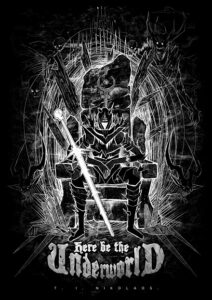
T: Your comic series has beautiful, poetic prose. That’s not something that we see too often in comic books. How did you come to decide that it was important to include that?
TIN: Ah! The poetry in the comic…is in fact an accident of a sort. To make a very long story somewhat shorter, one of my best friends had an inspiration after seeing a picture on the internet and wrote a couple of lines on a piece of paper and sent it to me. Knowing me, he said: “See if you would like to do anything with this”.
For a few months we talked about the story, and I told him that I would like to have it take place in the Underworld of ancient Greek mythology and have different creatures known to us show up. So, I started writing and at some point, I wanted Lachesis, one of the three Fates, to speak. I wanted such a character to be unique in some way. So, after many trials and even more errors, I had her speak her phrase: “Shadow remember fear, shadow remember pain. Know you are in the Underworld and this is now your plane…” After that, I kept going with descriptions of the Underworld, and the main character, and the creatures he met, but it all felt somehow lesser. I kept going back to those few lines, and I really like them. The idea of writing the entire thing in that style came to my mind but I waved it off as ridiculous. And then I abandoned this project for over a year. I simply did not like writing it as it was, and I knew I did not have what it takes to do the whole thing in a poetic style.
Never in my life did I feel drawn to poetry in any way. So, it felt ridiculous that I might write something like that. Then, during my vacation time, I found myself alone in my village, with no work and no distractions for about two weeks, and I started entertaining the idea of picking it up again. And I did. I wrote one chapter, which admittedly was very short, barely a single page, but the rhythm that it forced on my brain every time I read it was so enjoyable, I simply had to go on! So, I wrote the two first books on that vacation, but then I had to go back to work, and I abandoned it again, until a year later, when I found myself at that exact same spot again. And I heard the thing calling. So, I picked it up again…and I finished it. The few people I showed it to liked it, and then I met my illustrator Enoziworld, who is as much a nerd for this sort of thing as I am, and we decided to turn it into this sort of comic four-part series!
T: When it comes to Here Be the Underworld, it seems reasonable to believe that you would continue with the poetic prose. Do you think you’ll have any other projects that will utilize that style in the future, or is that something that you feel works specifically when it comes to that setting?
TIN: I have written a few more things in that form, but they are all shorter and in Greek. I have no idea if they will ever see the light of day. Maybe many years from now I will make a collection of my favorites just for the fun of it. However, when it comes to attempting anything like HBTU again… I don’t know. When I finished it, I took a very deep breath, because I really liked it as I read it, and I constantly had that fear that the next line would ruin it! We will see how others see it when every book gets published. But it would have to be a very compelling idea to make me attempt something like that again.
T: I have seen a few instances now where the imposter syndrome seems to crop up! But you really are a very talented storyteller, both in your prose, and in your command of the English language. What would it take for you to be able to rationalize your skills as ones you’ve earned and demonstrated, and not just a fluke?
TIN: It might take a psychologist to answer that one correctly, but as far as I am concerned, I think having people affirm your actions is usually a key factor in such issues. The stories have no problems for me. They were tailored to my current likes and dislikes. Things may be different in the future. I have said the same about other things a decade ago and now I am a different person. My skill I think is only a matter of perspective. It will be scrutinized by everyone else in due time. I am aware of what I can do, and I hope to add to that in time. I do thank you though, for seeing my writing in a positive way.
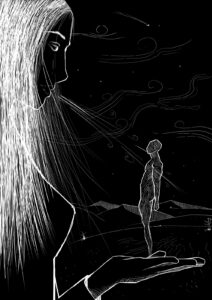
T: The art for both your comics and your sci-fi book are consistent in their presentation. Are you the artist, or have you collaborated with someone who you’ve found meets your expectations?
TIN: The two have, in fact, different artists, but they are indeed very similar for a reason. I am definitely not the artist. For The End of History, I had the artwork done by one of my closest friends Giorgos Kalimbo, who is also the man who inspired Here be the Underworld. He is a professional martial artist with great talent for drawing, yet very little time to work on it. He did offer to help me with my book and kind of saved me, since he had already read it before publication and could picture the scene from the book in his mind. For the comic though, he hardly had enough time, since he was too busy preparing for professional fights. He made me a cover, but since he could not follow through, we both decided that I should look for someone to do it professionally. So Enoziworld came into the picture, and I specifically asked him to follow the style that George used for his own cover, and now here we are. A great shout out to both of them. George never asked for a cent for his work and Enoziworld offered such a low price that made me feel bad. Maybe I should start calling myself an artist, it fits well after struggling!
T: Going forward, for the sake of consistency, do you think you’ll continue trying to lean on Enoziworld? Or are you going to begin filling out your pantheon of artists so that you can bring additional styles to your work?
TIN: Enoziworld is becoming a close friend. So long as he has the time and patience to work with me, I would rather we stick together. And if George provides more of his art, it will be extremely welcome as well. Enoziworld and I have also talked about collaborating on a side project of his when we both have some time… We will see. HBTU is definitely his baby now. All 4 books. I am always open to working with other people if they provide me an offer, but as long as work keeps me busy, the reality of time keeps my projects limited. I am always hoping that will change.
T: If someone wanted to find out more about you online, where could they go to find that information?
TIN: I have created an Instagram account specifically so that I may update any followers about new projects and even more about any new deals such as sales and giveaways! I am not very tech savvy, and I am spending a lot of time trying to educate myself on that as well, since I only just started figuring out how to offer free electronic copies of the books for limited time periods, so I also have to figure out how to let as many people as possible know about it, with my limited means. Which is also another reason I am thankful for this interview. I am also trying to get some visibility through a TikTok account, but it really is not my strong suit. Both of the accounts can be found @t.i.nikolaos, and as a bonus, there is my Goodreads account, that I am working on understanding as well, also under the same name!
T: Have you considered having work done on a website so that people could find all your work in one place? You certainly seem like you have a growing catalog and enough content to draw new readers in!
TIN: A website will be useful of course, and I have thought about it. It will probably happen later, when HBTU has provided enough material for me to put up there along with The End of History and its sequels. My resources are very limited right now, and I would rather invest all I can on the realization of my projects, so the development of a website will have to wait.
T: What would be your ideal way to market your book to your growing audience? Would you send them to one of your social accounts, or develop a newsletter of sorts?
TIN: I am honestly still educating myself on that front. I do have an Instagram account where people can get updated on all new projects (as mentioned earlier) @T.I.Nikolaos. You can also see additional art from Here Be the Underworld there. I also tried to collect everything on a link tree that is available through that account. But as I mentioned, right now my means are very limited…
T: T.I., I wanted to thank you for spending your time introducing me to your worlds. It’s always great to see someone who is so passionate about the arts, and I’m eager to see you spread more awareness about yourself to readers and fans!
TIN: Thank you! That is exactly why spaces such as this are so valuable!
T: Once again, I’d like to express my gratitude to T.I. Nikolaos for allowing us to draw back the curtain a little, especially during some of the busy times, where they’re working on so many projects. We recently showed off a bit of two of their projects, but the one we promoted a little more deeply was their feature length sci-fi. You can see the promo for that here, or you can check out The End of History: The World Behind Walls on Amazon today!
Michael DeAngelo
Latest posts by Michael DeAngelo (see all)
- Fantasy Promo – Quinine - July 25, 2024
- Sigil Art – Grim’s Hold - July 24, 2024
- Fantasy Promo – Light the Shadows (Under Elfhame’s Stars) - July 24, 2024
